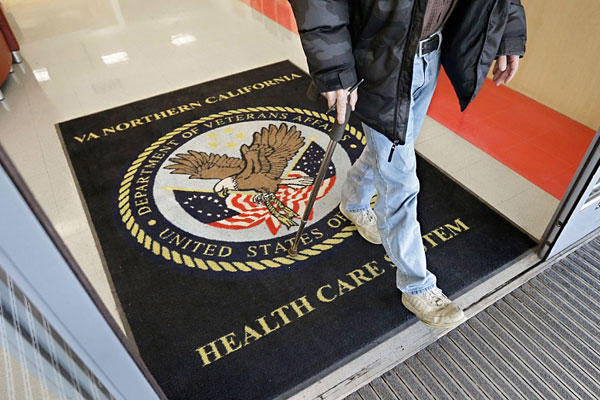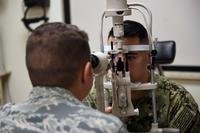 Military Update: Seven of 15 outside health advisors appointed to recommend ways to improve veterans’ health services over the next two decades have proposed shutting down all VA medical centers and outpatient services, and having its nine million enrollees get their medical care in the private sector.
Military Update: Seven of 15 outside health advisors appointed to recommend ways to improve veterans’ health services over the next two decades have proposed shutting down all VA medical centers and outpatient services, and having its nine million enrollees get their medical care in the private sector.
The 34-page “straw man” document released by the congressionally-created Commission on Care, calls for an immediate halt to construction of new VA hospitals and clinics, and launch of a “BRAC-like process” to begin closing existing facilities. Shuttering the largest medical system in the country would leave the VA to be “primarily a payor” for the care veterans would receive from civilian community doctors and health facilities.
To entice these physicians and facilities to accept more veterans as patients, the straw man document proposes that VA reimbursement rates be set five or 10 percent higher than Medicare pays.
A slim majority of commissioners have not endorsed dismantling the Veterans Health Administration with its 288,000 employees and $63 billion budget. In fact its chairperson, Nancy M. Schlichting, chief executive officer of Henry Ford Health System in Detroit, warned colleagues in an open letter against recommending a “payor-only” role for VA in their final June report.
“It is conceivable that VHA could become only a payor in the future,” Schlichting wrote, “but if we recommend it now the report recommendations…will likely be dismissed. A recommendation of that kind would not only provoke a strong backlash from stakeholders but further demoralize VHA staff and exacerbate recruitment and retention challenges.”
Backlash from veteran service organizations was swift. The American Legion noted that many commissioners are medical industry executives who stand to gain financially if VA care is privatized. Paralyzed Veterans of America said placing vets with special needs into private sector care “is a death sentence” because community providers are minimally experienced to provide complex care over the lifetime of severely injured veterans.
Dr. David J. Shulkin, VA under secretary of health, also criticized the straw man recommendations, but he is grateful they surfaced so early.
“This would be a terrible mistake, a terrible direction for veterans and for the country, to essentially systematically implement recommendations that would lead to the end of the VA health care system,” Shulkin said in a phone interview Tuesday.
The controversial ideas popped, however, two months before a final report is due to the President and Congress. That’s time enough, he said, to educate commissioners on “transformative steps” VA already has taken to preserve the system and better integrate VA care with community care.
Schlichting, appointed by President Obama, said in an interview Wednesday that given differences of opinion since commissioners began work last fall, she asked Commissioner David Blom, a health care executive from Ohio appointed by then-House Speaker John Boehner, to prepare the straw man document.
By definition, she said, “it’s to be evaluated, criticized and considered as part of our discussion as we are…driving toward a consensus final report.”
The final report will be “veteran centric” and, if Schlichting prevails, will support “the most integrated model possible to ensure veterans have appropriate choice access to highest quality services.”
The straw man says the VA health system is so broken there’s “no efficient path to repair it.” It’s a theme often heard from Republican lawmakers, particularly in the House, in hearing after hearing the past two years. Five commissioners who support ending VA care are Republican appointees including all three named by Boehner before he resigned last year. One of his appointees, Darin Selnick, advises Concerned Veterans for America, a lobby group funded by the billionaire Koch brothers that seeks to cut budgets and responsibilities of the Department of Veterans Affairs.
Though the straw man correctly identifies “serious systemic issues” across VA health care, Shulkin said, the system can be repaired. He said he was disappointed the straw man ignores reforms VA has launched the past year including its call for legislation to improve access to community care.
“We are bringing these new perspectives and industry-wide best practices to the VA and really creating that type of bold transformation that the straw man calls for,” Shulkin said. He hopes the commission embraces VA’s vision of a system “that takes what’s best within VA, what’s best within the private sector, and creates an integrated approach for health care.”
Shulkin became VA’s top health executive nine months ago, after 30 years as a physician and medical center manager in the private sector.
“If it was simply better for veterans to get their care in the private sector,” and have VA pay for it, “I would be all for that,” Shulkin said. But veterans would lose two essential components of VA-provided care.
One are the aspects of care that don’t exist in the private sector -- expertise in prosthetic and orthotics, post-traumatic stress and traumatic brain injury, spinal cord injury and loss of hearing or sight, and polytrauma centers that treat the most devastating injuries of war or training mishaps.
“Most Americans understand that the people we send off to war have different needs than the general population,” Shulkin said.
But the second component now at risk, he said, “I’m not sure people do understand, because I know I didn’t until I came into the VA system and began to practice the type of care VA delivers.” That is VA’s “comprehensive and holistic approach” to delivering care. It focuses not only on patients’ physical pain but social, psychological, emotional, even economic wellbeing, Shulkin said. For example, VA mental health care is integrated with primary care, something not seen in the private sector.
“If we were simply to turn our veterans out onto the street with a voucher, they’d find that the type of care they’re getting is not anywhere near the level of care they’re able to get within the VA system,” he said.
“I absolutely agree with that,” said Schlichting who heard Shulkin address commissioners last week. “I also believe that some of the models within the VA system should be emulated by the private sector, particularly mental health and the integrated primary care/mental health model, which is superior to anything I’ve seen in most of the private sector.”
“In the end, when the commission has all the information, we’re hoping this turns out to be a much more balanced report,” Shulkin said.
Send comments to Military Update, P.O. Box 231111, Centreville, VA, 20120, email milupdate@aol.com or twitter: Tom Philpott @Military_Update.
# # # #
Tom Philpott has been breaking news for and about military people since 1977. After service in the Coast Guard, and 17 years as a reporter and senior editor with Army Times Publishing Company, Tom launched "Military Update," his syndicated weekly news column, in 1994. "Military Update" features timely news and analysis on issues affecting active duty members, reservists, retirees and their families.
Visit Tom Philpott's Military Update Archive to view his past articles.
Tom also edits a reader reaction column, "Military Forum." The online "home" for both features is Military.com.
 Tom's freelance articles have appeared in numerous magazines including The New Yorker, Reader's Digest and Washingtonian.
Tom's freelance articles have appeared in numerous magazines including The New Yorker, Reader's Digest and Washingtonian.
His critically-acclaimed book, Glory Denied, on the extraordinary ordeal and heroism of Col. Floyd "Jim" Thompson, the longest-held prisoner of war in American history, is available in hardcover and paperback.




